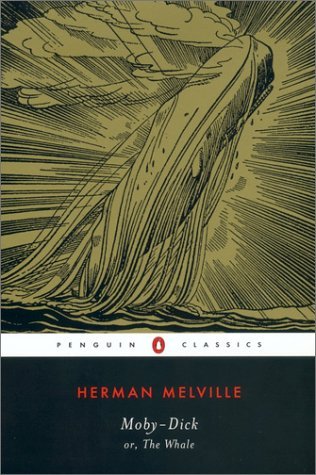
Moby-Dick or, The Whale
written by Herman Melville
720 pages // published in 1851 // classic fiction
BOOK DESCRIPTION
"It is the horrible texture of a fabric that should be woven of ships' cables and hawsers. A Polar wind blows through it, and birds of prey hover over it."
So Melville wrote of his masterpiece, one of the greatest works of imagination in literary history. In part, Moby-Dick is the story of an eerily compelling madman pursuing an unholy war against a creature as vast and dangerous and unknowable as the sea itself. But more than just a novel of adventure, more than an encyclopaedia of whaling lore and legend, the book can be seen as part of its author's lifelong meditation on America. Written with wonderfully redemptive humour, Moby-Dick is also a profound inquiry into character, faith, and the nature of perception.
"It is the horrible texture of a fabric that should be woven of ships' cables and hawsers. A Polar wind blows through it, and birds of prey hover over it."
So Melville wrote of his masterpiece, one of the greatest works of imagination in literary history. In part, Moby-Dick is the story of an eerily compelling madman pursuing an unholy war against a creature as vast and dangerous and unknowable as the sea itself. But more than just a novel of adventure, more than an encyclopaedia of whaling lore and legend, the book can be seen as part of its author's lifelong meditation on America. Written with wonderfully redemptive humour, Moby-Dick is also a profound inquiry into character, faith, and the nature of perception.


If you're wanting to fall into an epic sea-faring adventure – this could have been it, but not quite.
If you're wanting a story about a man's need to exact revenge on an animal that stole his leg (and that animal has no intention of returning it, obviously) – well, yes, this might be it.
If you're also wanting to learn a whole lot about the history of whales, the anatomy of whales, how to run a whaling ship, and myriad other textbook facts about whales – well, this also might be it.
Just read this paragraph from chapter 104:
“One often hears of writers that rise and swell with their subject, though it may seem but an ordinary one. How, then, with me, writing of this Leviathan? Unconsciously my chirography expands into placard capitals. Give me a condor’s quill! Give me Vesuvius’ crater for an inkstand! Friends, hold my arms! For in the mere act of penning my thoughts of this Leviathan, they weary me, and make me faint with their outreaching comprehensiveness of sweep, as if to include the whole circle of the sciences, and all the generations of whales, and men, and mastodons, past, present, and to come, with all the revolving panoramas of empire on earth, and throughout the whole universe, not excluding its suburbs. Such, and so magnifying, is the virtue of a large and liberal theme! We expand to its bulk. To produce a mighty book, you must choose a mighty theme. No great and enduring volume can ever be written on the flea, though many there be who have tried it.”
I'll say this: Reading Moby Dick is like reading a fiction book and a non-fiction book at the same time; the chapters go back and forth between a swashbuckling adventure and facts about whales. I'm not a fan of the “essays”, although I guess all those essays contribute to the overall aura of the making of the essential book on whales. The story though is interesting enough, and there's bits of comedy rolled in there, which is a truly refreshing drink of water... in a vast sea of words. :)
When I think about the story itself, I see the topic of obsession, with Captain Ahab and his monomania. He was certainly crazed to be going after that whale, while nothing else mattered to him in the world. He just happened to have a whole crew of men that would aid him in this mania.
Characters. Definitely there are some memorable characters in this novel, such as Ishmael, Captain Ahab, Starbuck, Queequeg, and others.
I think there is a lot of historical context that sometimes the modern reader is missing. After I (finally) finished, I felt like although I read the words on each page, I still missed something in the symbolism, or in the gray areas that I just wasn't sure what it meant. I dived right into Nathaniel Philbrick's 'Why Read Moby-Dick?' next, to help me. (Personally, I recommend reading that particular book after finishing the classic itself, and not before... just so that you don't learn all about the outline of the plot of Moby Dick.) Anyways, I then learned more about Herman Melville himself, and some bits about why certain elements are brought up in the book.
“There is, one knows not what sweet mystery about this sea....”
One BIG element in the book, that just wouldn't stop popping up... Herman Melville's vocabulary. It's like he used a dictionary to construct his sentences. How did he ever learn so many weird, rare words, and remember to use them all in this one (albeit long) novel? It's amazing how many dozens (hundreds?) of words are in this book that I have no clue what they meant (I tried to keep a dictionary handy for most of my reading). For the first few chapters, I felt that I must be reading something akin to Shakespeare (i.e., something that although is written in the English language, you still need to translate it). I fell into the flow better as I kept reading... but still.
Note to the discerning reader: There is some mild swearing and taking the Lord's name in vain.
There's a handful of scenes that bring out the nasty side of the whaling business. Once or twice it was getting a bit gory, but... oh well.
As of yet, I'm on the fence as to whether of not I wish to read more by Melville, or not.



This is book #9 for me in the Back to the Classics 2018 challenge.
[CATEGORY: Classic That Scares You]
...Yep, the thickness of the spine scared me, plus knowing it might be a deep story to take in. Whew!

P.S. Like and vote for this review on Goodreads and Amazon.













I've considered this one a time or two for classics challenges, but so far haven't take the plunge. Maybe someday!
ReplyDeleteMaybe someday I will read Moby Dick, but first Pickwick Papers is on my shelf waiting to be read, and the next Anthony Trollope Palliser novel.
ReplyDeleteI have always been intrigued by this book. I am not sure about all of the non-fiction elements. I think that this one will be sitting on the shelf for a while longer. One day I will give it a try as well. :)
ReplyDelete